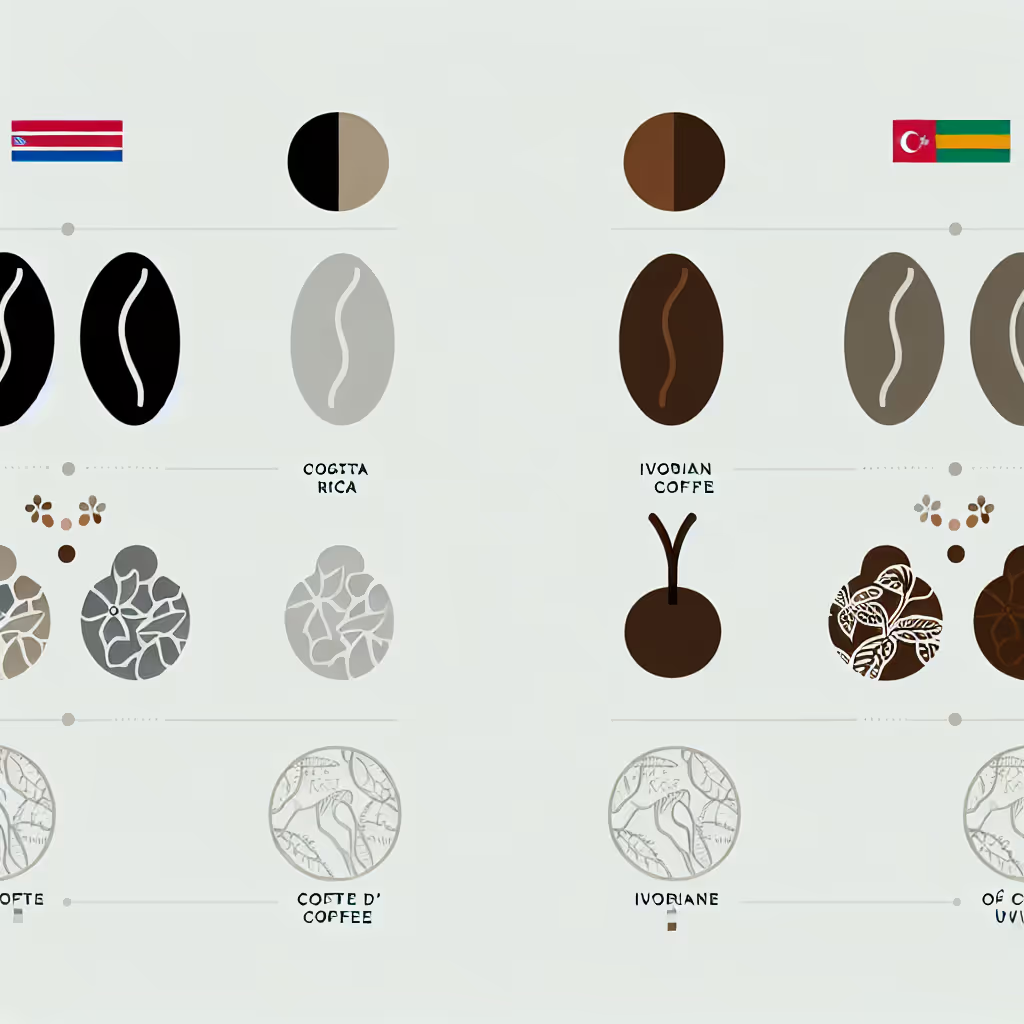Costa Rican Vs. Ivorian Coffee
This comparison explores the distinct qualities of Costa Rican and Ivorian coffee, examining their flavor profiles, growing conditions, and brewing methods to help coffee enthusiasts make informed choices.

Brief Description
Costa Rican coffee is renowned for its clean, bright, and well-balanced profile. Grown in ideal conditions with rich volcanic soils and high altitudes, these beans offer a perfect harmony of acidity and body. The country's commitment to quality and sustainability shines through in every cup, delivering a consistently excellent coffee experience that's both complex and approachable.
Ivorian coffee, predominantly Robusta, is known for its strong, bold flavor profile. Grown in the lush, tropical climate of Côte d'Ivoire, these beans contribute significantly to the country's economy. While not as internationally renowned as some other African coffees, Ivorian beans are prized for their consistency and are often used in espresso blends and instant coffee production.
Importance of Comparison
Comparing Costa Rican and Ivorian coffee is crucial for coffee lovers seeking to expand their palate and understand the diverse world of coffee origins. These two regions offer contrasting experiences, from the bright, balanced Arabica beans of Costa Rica to the bold, robust flavors of Ivorian coffee. Understanding their differences helps consumers make informed decisions based on personal taste preferences and brewing methods.
Key Attributes
Origin
Costa Rican
Ivorian


Consumer Guide
When choosing between Costa Rican and Ivorian coffee, consider your flavor preferences and brewing method. Costa Rican coffee, known for its clean, bright profile with notes of citrus, honey, and chocolate, is ideal for pour-over, French press, and espresso. It's perfect for those who enjoy a well-balanced, complex cup. Ivorian coffee, predominantly Robusta, offers a strong, bold taste with earthy, nutty, and chocolatey notes. It's excellent for espresso, French press, and Moka pot brewing, appealing to those who prefer a more intense, full-bodied coffee. Consider the altitude difference: Costa Rican beans grow at 1200-1800m, while Ivorian coffee thrives at 200-1000m, affecting flavor development. Lastly, think about processing methods: Costa Rica offers washed, honey, and natural processes, while Ivory Coast focuses on natural, washed, and semi-washed methods.
Expert Opinions
Coffee expert Maria Rodriguez notes, 'Costa Rican coffee exemplifies balance and complexity, offering a gateway to specialty coffee for many enthusiasts.' On Ivorian coffee, master roaster Jean Dupont states, 'While often overlooked, Ivorian beans provide a consistent, bold base for espresso blends and are essential in the instant coffee market.' Both experts agree that comparing these origins highlights the diversity of global coffee production and flavor profiles.
FAQs
Costa Rican coffee is known for its clean, bright profile with citrus, honey, and chocolate notes, offering a well-balanced cup. Ivorian coffee, primarily Robusta, has a stronger, bolder taste with earthy, nutty, and chocolatey flavors, providing a more intense coffee experience.
Costa Rican coffee grows at higher altitudes (1200-1800m) in volcanic soil, contributing to its complex flavor profile. Ivorian coffee thrives in lower altitudes (200-1000m) with a tropical climate, resulting in a more robust, straightforward flavor. These differences in growing conditions significantly impact the beans' development and final taste.
Costa Rican coffee excels in pour-over, French press, and espresso methods, highlighting its balanced profile. Ivorian coffee is best suited for espresso, French press, and Moka pot brewing, which complement its bold, strong flavors. Experiment with different methods to find your preferred way of enjoying each origin.
Costa Rican coffee typically undergoes washed, honey, or natural processing, each method enhancing different flavor aspects. Ivorian coffee is primarily processed using natural, washed, or semi-washed methods. These processing differences contribute to the unique flavor profiles and characteristics of each origin.
Ivory Coast produces more coffee annually, with approximately 100,000 metric tons compared to Costa Rica's 87,000 metric tons. This difference reflects Ivory Coast's focus on Robusta production for commercial markets, while Costa Rica emphasizes quality Arabica beans for specialty markets.
Costa Rican coffee's balanced profile makes it versatile for any time of day. Its bright acidity can be refreshing in the morning, while its complexity is enjoyable throughout the day. Ivorian coffee's bold, strong flavor is often preferred for morning or after-meal consumption, providing a robust caffeine boost.
Conclusion
Comparing Costa Rican and Ivorian coffee reveals the rich diversity in the world of coffee. Costa Rican beans offer a clean, bright, and well-balanced profile, ideal for those seeking complexity and nuance in their cup. Ivorian coffee provides a bold, strong experience, perfect for espresso lovers and those who enjoy a robust coffee flavor. While Costa Rica focuses on high-quality Arabica production, Ivory Coast's Robusta beans play a crucial role in the global coffee market. Ultimately, the choice between these origins depends on personal taste preferences, brewing methods, and desired coffee experience. We encourage coffee enthusiasts to explore both origins to appreciate the unique qualities each brings to the table.






